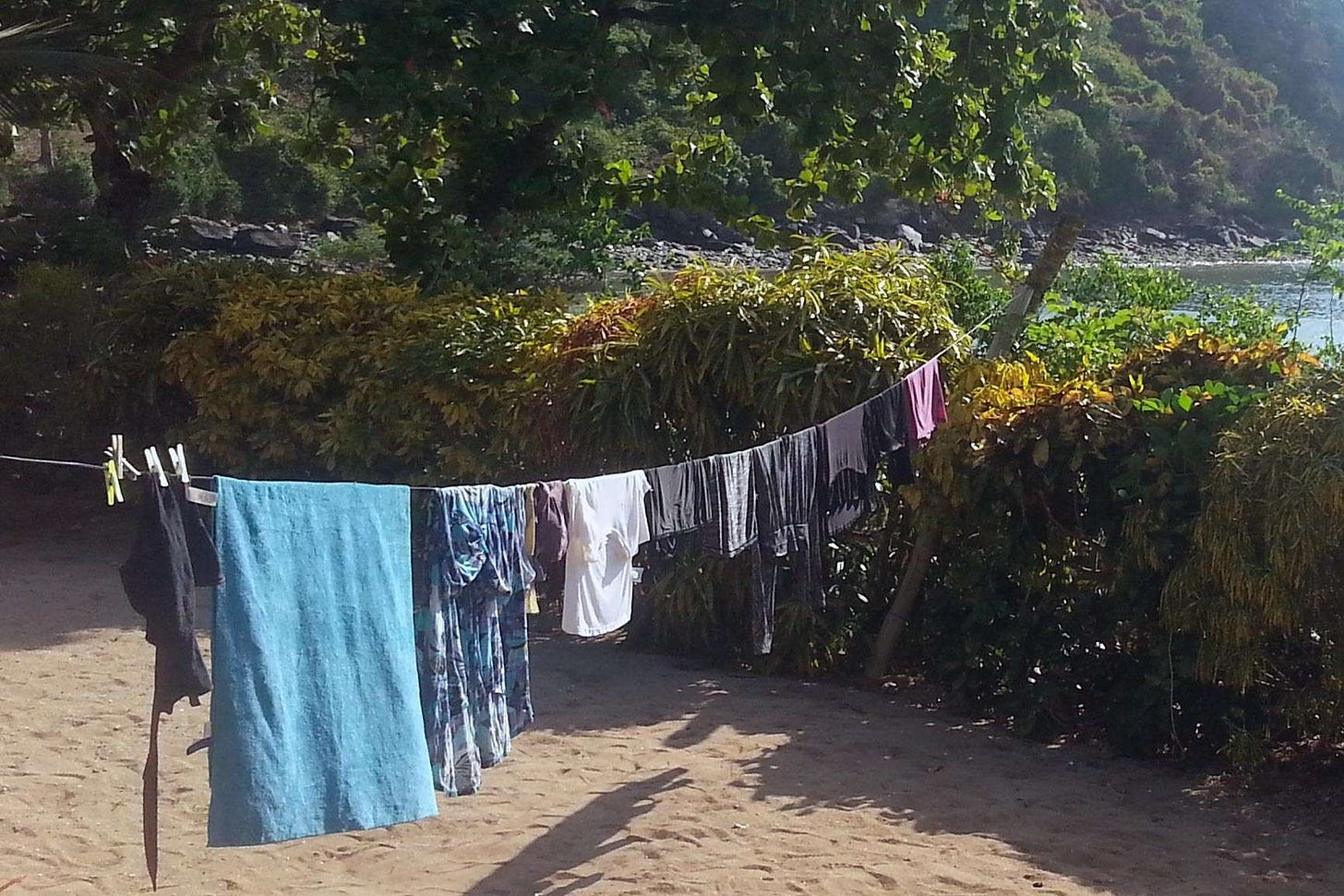I did the wash today. Not an extraordinary event these days—even for a male. Afterwards, I hung the wash out to dry, which was unusual for me. That's something I can't do in the heart of New York City where I live. I wouldn't, even if I could: the air. I could have used the clothes dryer here, but the dryer at the cottage we rent on this island in southeastern Maine is too noisy; it goes on forever, a sixty-minute hyper-buzz that smothers the quiet of this most serene point on the island. I hesitated, though, I have to admit. Hanging out the wash takes time. With the dryer, you just push a button, and you walk away. But the desire for stillness prevailed over laziness. I took the heavy, damp clothes to the back porch and began pinning them to the line. This line is bowed as a very pregnant cat. It climbs about thirty feet on a slant, nearly touching some rocks along the way, until it reaches its twin pole on a rise. I had previously used it only to hang a bathing suit or two to dry, nothing more.
What this did, this hanging out of the wash, was to give me the sheer satisfaction of completing a domestic task, a satisfaction similar to that Thoreau describes in Walden after sweeping out his cabin. It is a domestic task still performed in many parts of the world, if not here, and one that connects you to the old, simple patterns of life. But this did something else, something unexpected. It opened a chest-full—or rather a hamper-full—of memories that had been in profoundly deep storage in my heart. It took me back to Virginia Beach, Virginia where I grew up. More specifically, it took me to 1955, to my back yard. And in this backyard, my mother was hanging out the wash, and I was there, watching her. My mother, dead these four years now.
Yes, suddenly, there she was. I was, too. I was myself as a boy. I was watching my mother work. I was watching her doing something she had to do at least three or four times a week. She was hanging out the wash to dry: providing clean clothes for her three children, and for her husband, and for herself. She worked efficiently, reaching above her and pinning the edges of the garments to the clothesline, brushing her rich brown hair away from her face from time to time as she worked. She had two or three wooden pins in her mouth at the ready, replenished steadily from an arsenal in her apron pockets.
She must be thirty-five or thirty-six. She is energetic and real and beautiful. I want to speak to her, but she doesn't like talking when she is hanging out the wash. She doesn't like doing the wash, period. I remember her telling me so, and she wants to finish it as quickly as possible.
Everything about washing clothes and hanging them out to dry in Virginia Beach in 1955 comes back to me on that Maine hill. I know there is a big difference between my hanging out the wash here in Maine and my mother's inescapable continual routine of long long ago. I remember driving in the car with her, and seeing it start to rain, and she, full of things in her head, slapping the wheel lightly and saying, “Oh, God, the wash!” She knew the distance between her and the clothes was too great to retrieve them before it poured. So she knew the clothes were out there, getting soaked, getting heavier and heavier, even dragging themselves to the earth and into pools of water made by the rain. No dryers then—at least not for us. What should have been a sure thing was not, and had to be done all over again, with the added work of wringing out the drenched clothes, piece by piece.
I watched her as long as I could today, my mother, so alive before me I could hardly believe it. I continued watching her as I pinned my clothes to the even more deeply bowing line. I pinned shirts, socks, towels and jeans for my own six year-old daughter, and for me. But even then I could see my mother turn and look at me as I extravagantly used two, sometimes three, clothespins for each piece of laundry. “Double up on those clothespins, Richie!” She meant that two pieces of laundry could share the same pin. You get more on the line then, and the hanging will be over faster.
So there she was, my mother, my faraway gone mother. I could see her again as I had as a ten year-old: my coping—not always coping—mother. She, who was to have so many problems and pains later, whose heart was broken and who attempted to repair it with drink. She was mine, and I was hers, for a moment—for an eternity. I think that could only have happened to me here, on this Maine island, where the old verities of life are championed. These are the things which link us to the past and to people who, though dead and far gone, we will always love and try very hard never to forget. And I won't forget you, Mommy.



A poem is waiting in the wings of this memory, Richard. Thank you for your stories ♥️
I have a clothesline… I will think of your mother and you when I use it next … ✨